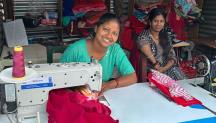

Active Participation of Women Essential to the Global Energy Transformation
Newsletter
By 2050, IRENA projects that there will be around 40 million jobs directly related to renewable energy and energy efficiency worldwide, a more than four-fold increase from today. Women comprise roughly half the world’s population, and their full inclusion is vital to ensuring that the new energy economy is based on the largest pool of talent, knowledge and skills. Moreover, energy poverty has a disproportionate effect on women, and one of the most effective ways to ensure that renewable energy policies and practices consider the gendered impacts of energy is to empower women to shape them.
In 2016, IRENA conducted a survey of renewable energy companies worldwide and found that women represented an average of 35% of the workforce, a share greater than in the traditional energy sector, but lower than in the broader economy. In general, women are severely underrepresented in science, technology, engineering and mathematics (STEM) fields and across the clean energy sector. The disparity is even greater at the management level. An index by Ernst & Young shows that in 2016, women comprised only 16% of the boards of the world’s largest power and utility companies
The reasons for this are numerous, interwoven and context-specific. One factor is that women spend a disproportionate amount of time in unpaid care work and this constrains their ability to engage in education and income-generating activities. Workplace conditions, such as flexibility of work hours, equal pay, and support for childcare, and a lack of gender-sensitive policies are also important. Energy poverty also reduces the ability of women the participate in the workforce by creating health risks (for example related to indoor air pollution from burning fuels) and lower educational outcomes (for example due to lack of lighting to study by).
In the access context, however, women should not be seen as only beneficiaries but also as agents of change. For example, in Indonesia, women, who are generally the decision makers on energy issues at the household level, have been empowered as “Wonder Women” through the sale of solar technologies. Another, in Mali, is activating women as social entrepreneurs by giving them access to renewable-energy-based income-generating activities.
 To better understand the challenges and potential solutions to full and equal participation of women in the renewable energy sector, IRENA sat down with Yumiko Murakami, Chief of the Organisation for Economic Cooperation and Development OECD Japan Centre.
To better understand the challenges and potential solutions to full and equal participation of women in the renewable energy sector, IRENA sat down with Yumiko Murakami, Chief of the Organisation for Economic Cooperation and Development OECD Japan Centre.
Ms. Murakami has been the head of the OECD in Tokyo since 2013. Prior to taking the leadership position, she worked for 18 years as an investment banker in London, New York and Tokyo. Ms. Murakami also has experience within the United Nations, as part of a peacekeeping operation in Cambodia.
IRENA: How do you see the energy sector changing in Japan, and in Asia in general, and what are the implications for women, both as consumers of energy or as those working in the industry?
Ms. Murakami: Japan has just updated its long-term energy policy for 2050, so it is a timely question. One can tell from the energy plan for 2050 that the momentum for the renewable energy sector is stronger than ever now in Japan because the plan specifically calls for the achievements of the goals set by the Paris Agreement as well as the sustainable development goals (SDGs). Japan is not unique in this regard. Many other countries in Asia have started to shift gears toward renewable energy as well.
In this context, implications for women are quite interesting. Japan lags behind many countries when it comes to gender equality. Particularly the energy sector is more male-dominated than the rest of the economy. However, the landscape is changing for women today as there is a stronger need for the economy to have more women at work place due to shrinking work force on back of aging demography. In fact, the female labour market participation rate of Japan has been steadily increasing in the recent years and it is now higher than that of the United States. As more and more women join the workforce, we have a very good chance that many of them will find fruitful careers in the renewable energy sector.
Being a new growth business, it is a very attractive industry for forward-looking individuals, as well as women who may prefer to work in an environment without cultural biases. From the consumer perspective, women also play a critical role to promote clean energy choices. The retail market for electricity has been recently deregulated in Japan, giving consumers more choices for energy source alternatives. Often times, the ultimate decision for various energy options is in the hands of women. It is critical to inform and educate women on long term implications of the choices they make.
IRENA: Last year, three of the four biggest renewable energy lenders in the world were Japanese. What are some of the ways that Japan can use this influence to drive greater gender equality in renewable energy?
Ms. Murakami: There is increasing awareness among investors for the role of finance in many of the areas specified by the sustainable development goals (SDGs). The fact environmental, social and governance (ESG) theme investment is becoming one of the most powerful forces in the global capital markets is very encouraging. Companies in Japan, including financial institutions as well as operational firms, realize they have the fiduciary responsibility to ensure their investments meet all expectations to promote the SDGs. Gender equality is clearly one of the most important areas for them to watch. It is highly desirable for the Japanese lenders to set clear standards and guidelines for gender equality for the projects they finance. It is also important to note that a diverse work place tends to encourage innovations, which can in turn improve productivity, ultimately giving lenders higher return on their investment in a long run.
IRENA: The energy economy of the future will be renewables-based, connected, and digital, and this requires a STEM-advanced workforce. Despite efforts, these fields remain male-dominated. What, in your view, are some of the ways that governments can support the engagement of women in STEM fields?
Ms. Murakami: This is a big challenge in Japan. Less than 15% of engineering students in Japan are female. While there is almost no difference between men and women in their educational attainment today, male students are 10 times more likely to choose technology-related fields compared to female students. Governments need to start gender mainstreaming at a much earlier stage than university or work place. It includes early career education, encouraging both girls and boys to consider STEM fields as well as efforts to eradicate unconscious gender biases, such as introducing female role models in STEM occupations at school and at home. The role of government continues to be important beyond education, too.
In Japan, a new bill was introduced last year to promote female leadership in business. It requires enterprises with more than 300 employees to set goals and action plans to improve gender balance in the work force. The newly revised Corporate Governance Code also demands listed companies to have at least one female board member. This type of initiative is helping gender equality.
IRENA: You have worked, and excelled, in traditionally male-dominated fields, such as finance and international diplomacy. What were some of the barriers that you faced and how did you overcome them?
Ms. Murakami: I spent most of my career on Wall Street. Although the investment banking industry is perhaps one of the most male-dominated businesses, I was fortunate to have colleagues and bosses who mentored and sponsored me. When you are minority, you need to step out of your comfort zone and identify people who can support you on your professional growth. They may not find you unless you find them: it is up to you. Another important element is to understand your competitive advantage and make sure you are adding value by differentiating yourself from the rest. Because you are a minority, often the only woman in your team or division, you may bring something unique to the table. This is not the same as using the gender card. This is all about making diversity work.
IRENA: What advice, from your own experience, can you give to other women looking to advance their careers in the energy sector?
Ms. Murakami: As mentioned earlier, women need to realize that they have so much to offer because they are (at least at this point) minority and different from men. The only way for the energy sector to improve productivity is through innovation. Innovation requires diversity. Sometimes women may feel as if they need to behave like men to be accepted by their male colleagues. I think this is a mistake. Women should feel free to be themselves. Their thought process, ideas and feelings maybe different from those of men. That is exactly what work place needs: a wide range of views.




